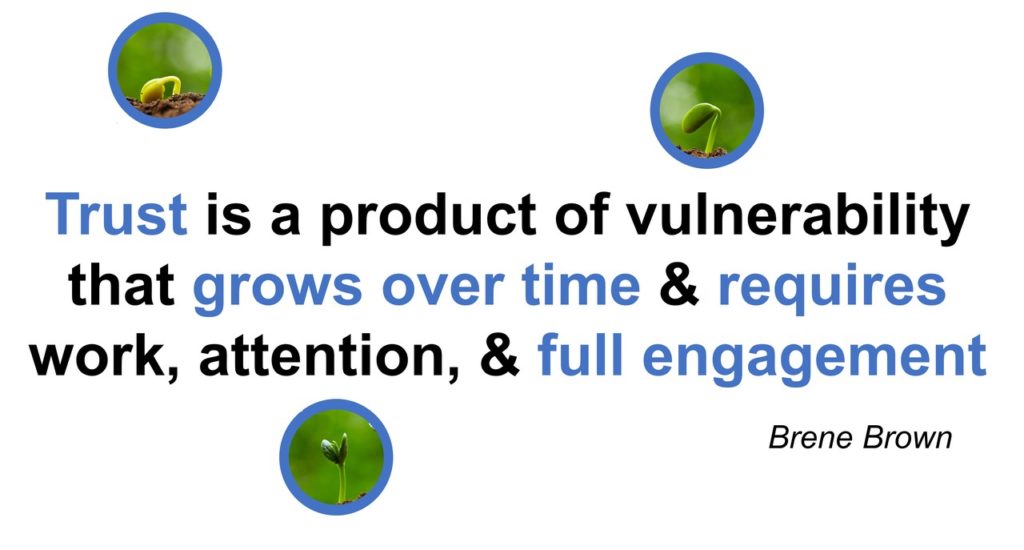Are you a GABS Communicator or are you an EAR Communicator?
Many people do not realise that their natural tendencies in having a conversation can break trust and be destructive to the relationships that they have.
The quality of a workplace’s culture and its performance boils down to a few crucial factors. Relationships are a major one.
There are many different types of relationships in the workplace, but the most important ones are those between team members and those between managers and team members.
The better the quality of these relationships, the more team members feel at home and safe to communicate in an open and transparent way.
For example, team members who feel this way are not afraid to ask questions, raise concerns and propose new ideas.
On the other hand, team members who do not feel at home and safe may hesitate to ask questions, because of how they might be perceived and the impact that it could have on their role and subsequent career. For similar reasons, they may not raise concerns or propose new ideas, feeling that they might be shot down instead.
Quality relationships contribute to a positive atmosphere.
What contributes to quality relationships? Well, just take a moment to think about what is the difference between a stranger and an acquaintance, or an acquaintance and a friend, a friend and a best friend?
The major difference is that the more we know about each other, the more we like about each other, and the more we trust each other, the more the quality and proximity of the relationships improves.
What impacts this?
Conversations.
There are different ways of having a conversation, and often, people don’t realise that their natural style of communicating can be negatively impacting their relationships.
GABS Communication
GABS is a simple ‘how not to communicate’ framework.
When we GABS, we:
> Grab the glory
Say a fellow colleague is sharing an accomplishment, when we ‘grab the glory’, we jump in and share our accomplishments or our role in a way that diminishes their efforts.
> Advise
Imagine that a colleague is sharing some ideas. When we ‘advise’, we may jump in over the top, recommending ways of sharing the ideas. We might even share other ideas in a way that leaves our colleague feeling dis-empowered.
> Belittle
When we belittle, we tell others that their ideas or accomplishments are not great at all. We make them ‘little’, not even worthy of telling.
> Side Step
When we sidestep, we change the conversation completely. Your colleague might have asked for constructive feedback on their performance, and instead, you bring up new ideas that can impact the entire team and have nothing to do with specific feedback requested by your colleague.
—
What is the impact of GABS? Just imagine being on the receiving end, you may likely feel dis-empowered, frustrated and maybe even furious about the behaviour of the other person. Trust in the relationship has been eradicated.
If you are on the giving end of GABS, unless you are completely self-absorbed, you may likely sense the frustration of the receiving party. However, sometimes people who do GABS don’t realise they are doing it.
Transforming GABS into EAR
If GABS is the cause of dis-empowering and trust-eradicating conversations, then EAR is the solution to empowering and trust-building conversations.
EAR stands for:
> Expression
Expression means that your intention is to be with the other person, to listen and have a positive conversation (and to not GABS).
> Attentive Body Language
Your body language is focused on them, not on distractions or things around.
> Repeat Facts
Repeating facts back lets the person know you are listening. Listen genuinely and for what is important.
So What
The quality of our conversations impacts the quality of our relationships. At a workplace level, workplace relationships directly impact trust in the workplace, its culture and, in turn, the performance of your colleagues, team, and the entire organisation.
The first step is to know HOW you are communicating with the people around you. Are you coming from GABS or from EAR? Is your conversation empowering and stimulating growth in your relationship and culture or is it the opposite?
Knowing where you are is crucial. Then you can do something about it.
The question to ask yourself is:
– Am I empowering or dis-empowering in this conversation?
Know that even when you need to raise an issue or need to give challenging feedback, you can come from either an empowering or dis-empowering position.
If you are not sure, ask someone you trust about how you typically communicate. Sometimes, since we are so used to being ourselves, we can be blind to how our behaviours impact others, so others can help!
Have a play around and let me know your thoughts and experiences from becoming an EAR communicator!

